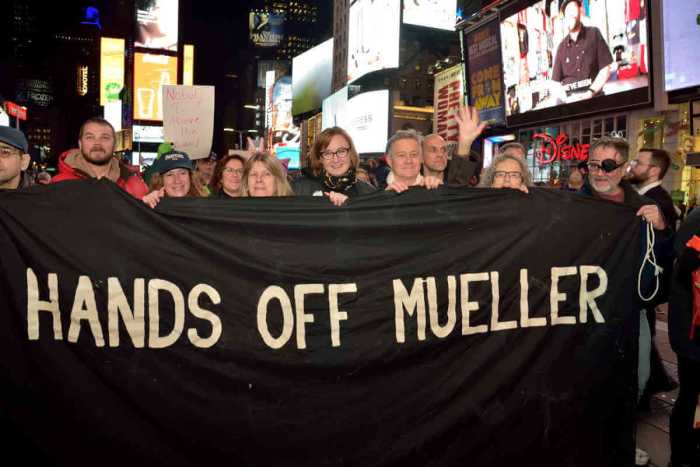Attorney General Jeff Sessions with President Donald Trump at the White House last year on the day he was sworn in. | WHITEHOUSE.GOV
Attorney General Jeff Sessions has issued an opinion toughening the standards for granting asylum to persons seeking to live in the US based on the claim they fled their home country because of persecution.
The focus of Sessions’ June 11 opinion was cases where women seek asylum based on past abuse by their husbands or domestic partners — and such circumstances received most of the media attention — but, depending on how broadly his opinion is interpreted, it may also pose barriers to LGBTQ people, particularly minors, fleeing actual or feared violence at the hands of their families and neighbors.
Sessions’ decision was presented as part of President Donald Trump’s pledge to his political base that he would reduce immigration and sharply limit the number of people who can gain admission to live here based on refugee status.
In hardline AG opinion, domestic and gang violence claims challenged
The statutes governing asylum claims give the attorney general (AG) significant authority to establish the legal interpretations and precedents applied by Immigration Judges and the Board of Immigration Appeals. IJ’s and the BIA fall under the Department of Justice, rather than within the independent Judicial Branch of the government, and Sessions’ opinion is binding on them.
The federal courts within the Judicial Branch have a very limited role in reviewing refugee decisions — to correct clear legal errors. They do not have authority to reject the factual and legal conclusions of the IJ’s and the BIA unless there is clear error, not just a difference of opinion about what the evidence shows. Sessions’ opinion emphasized that the BIA itself is also very limited in reviewing IJ decisions, and must defer heavily to IJ rulings on the credibility of witnesses and findings of fact.
The ultimate decision to grant asylum in any particular case, however, is up to the discretion of the attorney general, who is not bound by the BIA’s decisions.
Sessions’ action in the case before him not only overturned a BIA decision to grant a petitioner’s asylum bid, but also overruled a 2014 BIA decision that had been treated as precedent on the question of whether women who are victims of domestic violence are entitled to asylum in the US.
The asylum statute explicitly protects people who have suffered persecution in their home country on account of their race, religion, nationality, political opinion, or membership in a “particular social group.” The statute does not define “particular social group,” and its meaning has been developed by the BIA and the courts over decades. The AG has authority to designate decisions by the BIA as a precedent, and past attorneys general have done so with cases that defined particular social groups entitled to protection.
During the Clinton administration, Attorney General Janet Reno made an important advance by designating a 1990 BIA opinion that found that gay people could constitute a “particular social group” as a precedent. During the Obama administration, the Departments of Justice and Homeland Security issued guidance documents broadening the recognition of the protected status for LGBTQ people, in line with policy statements coming from the White House.
Since then, there have been many refugee cases in which IJ’s, the BIA, and federal appeals courts have considered LGBTQ applicants to be members of a “particular social group.” Indeed, in recent years, the Ninth Court of Appeals has issued a series of decisions finding that transgender people in Mexico are a particular social group that is highly vulnerable to persecution, to the extent of being presumptively entitled to protection under the international Convention against Torture. The court has taken particular note of the history of Mexican police officers and soldiers sexually assaulting and severely beating transgender women.
These Ninth Circuit opinions have routinely reversed rulings by the BIA and criticized both the Board and Immigration Judges for inappropriately relying on civil rights advances by the gay community in Mexico that have not necessarily benefited transgender people there, and for failing to consider sexual assaults by police and military personnel to be government actions.
In his June 11 opinion, Sessions stated that an applicant for asylum has the burden to show “membership in a particular group, which is composed of members who share a common immutable characteristic, is defined with particularity, and is socially distinct within the society in question; that her membership in that group is a central reason for her persecution; and that the alleged harm is inflicted by the government of her home country or by person that the government in unwilling or unable to control.”
He also wrote, “When the applicant is the victim of private criminal activity, the analysis must also consider whether government protection is available, internal relocation is possible, and persecution exists countrywide.”
For LGBTQ asylum applicants whose main persecutors are family members — parents, siblings, uncles, or cousins — or neighbors, fellow students, or co-workers, there have been some cases where IJ’s, the BIA, and the courts have accepted evidence that the government was unconcerned and would not provide protection. Such evidence usually takes the form of showing that the persecuted individual either unsuccessfully sought law enforcement help or was unable to in light of the well-documented negative attitudes of law enforcement officers toward LGBTQ people.
In some cases, however, the applicants have not been able to connect the necessary dots to make these showings and, even though having suffered severe persecution, were unable to win asylum.
These cases can be difficult and complicated for many reasons, including language barriers, lack of documentary evidence, and a predisposition by many IJ’s and the BIA to be skeptical about the undocumented claims of applicant. That predisposition will be exacerbated by recent reports that the Justice Department is contemplating quotas for the IJ’s to speed up the hearing process.
Another frequent problem is that individuals when first confronted by a government official upon entering the US, not being well informed about the evidentiary requirements, not assisted by a lawyer, and, in some cases, speaking a dialect in which available interpreters may not be fully conversant, may give a version of their story that varies — or seems to vary — from what they may state later in writing or as a hearing witness. IJ’s and the BIA frequently draw adverse conclusions about credibility based on such discrepancies. It doesn’t help their case that most applicants do not have legal representation, resulting in spectacles like young children representing themselves without adult assistance.
Sessions’ decision sought to tighten up the requirements for qualifying as a member of a “particular social group.” Although he focused on a woman claiming asylum as a victim of domestic violence, some of his language suggested possible disagreement down the line with decisions that have granted asylum to LGBTQ people. The courts have been divided in their handling of domestic violence cases, noting that the law’s explicitly listed categories do not include sex so that women, as such, do not constitute a particular group “socially distinct within the society in question.”
One of Sessions’ apparent goals in this decision is to try to bring some order to the case law by imposing a strict analytical test, under which women who suffer domestic violence are seen as individual victims rather than members of a particular social group. Evidence that a society has a “culture” of tolerating physical abuse of wives by their husbands did not strike him as a basis for concluding that women facing such abuse could be seen as a “social group.”
Sessions also expressed his disapproval of decisions that have, in his view, too easily allowed applicants to assert, without adequate proof, that their home government is or would be indifferent to the harms they suffer. In the case he chose to review, a BIA decision from 2016, he noted evidence that the applicant had obtained court orders of protection and lived in a country, El Salvador, whose criminal laws address violence within families.
A recent decision by the Philadelphia-based Third Circuit Court of Appeals denying refugee protection to a gay applicant from Honduras illustrates some of these problems in an LGBTQ context. In Martinez-Almendares v. Attorney General, released on May 2, the three-judge panel went to some lengths to explain why it was rejecting the petitioner’s challenge to an IJ ruling denying relief upheld by the BIA.
As in many such cases, the petitioner here did not have legal representation at any point in the process, including his appeal to the court. All but a very small proportion of refugee appeal cases are decided entirely based on written submissions to the court, which rarely provides petitioners the opportunity to present their cases orally in front of judges, and most opinions are not officially published. Some circuit courts have been so flooded with immigration appeals in recent years they have set up special procedures to expedite the cases.
Selvin Martinez-Almendares tried to enter the US on October 8, 2015, when he was taken into custody by Customs and Border Patrol agents. He then sought to claim refugee status. Immigration Judge Silvia A. Arellano rejected his claims and the BIA affirmed her decision.
Martinez-Almendares grew up in a small town where he was not out to anybody and feared a violent response from his father if he came out, but his mother had a close friend who was a gay man and — according to the hearing record before Arellano — lived openly in the town without any problem. Martinez-Almendares claimed that he knew only two gay men in Honduras — his mother’s friend and one other.
Martinez-Almendares moved to a city where he worked for a transportation company. He was the victim of a robbery by an armed gang member at his workplace, but there was no evidence his sexual orientation had anything to do with it. Nor was he personally acquainted with any gay people who encountered difficulties in Honduras because of their sexual orientation. However, based on television reports about gay men being targeted for violent crimes and his belief the government would not protect gay people from gang violence, a pervasive problem in Honduras, Martinez-Almendares decided to leave for the US.
The court observed that he had not personally suffered any persecution in Honduras on account of his sexual orientation, so he was not qualified for asylum. The panel also found that the evidence Martinez-Almendares presented did not compel a conclusion that he would suffer such persecution, much less torture, because of his sexual orientation if he were returned to Honduras. The BIA pointed out that the example of his mother’s gay friend showed that he could live as a gay man in his hometown without fear of persecution. The court also noted that Honduras now bans sexual orientation discrimination by law.
Martinez-Almendares’ argument boiled down to general evidence that Honduras was afflicted with out-of-control gang violence and there were media reports of gay men being victims of such violence, but the court did not see that as sufficient to meet the stringent standards for refugee relief, especially since the reports about gang violence were more generalized.
Among other things, the court agreed with the BIA that Martinez-Almendares had failed to show that the violent gangs in Honduras would necessarily know he was gay or that they would single him out for persecution on that basis. The gangs went after everybody who might appear vulnerable, regardless of their sexual orientation, the panel concluded. It is clear from this case that the US refugee system is not set up to automatically grant refugee status to gay people from Honduras based solely on generalized reports about the dangerous situation there and its government’s flailing attempts to deal with it.
As Sessions emphasized in his June 11 decision, evidence of individualized risk based on a listed characteristic or membership in a particular social group is the keystone of the refugee system. It is difficult, in many cases virtually impossible, for an asylum applicant — especially one held in detention under the Trump administration’s announced zero tolerance policy for unlawful entrants — to succeed without the assistance of a lawyer to assemble the necessary evidence and present his case to meet this standard. The court’s opinion anticipated many of the statements Sessions made in his June 11 opinion to justify the conclusion that applicants whose claim for asylum rested on past persecution by their family members or criminal gangs should usually not be found qualified for US asylum.
Although gang violence was not a focus of the decision Sessions was reviewing, he addressed it in his opinion.
“Generally,” he wrote, “claims by aliens pertaining to domestic violence or gang violence perpetrated by non-governmental actors will not qualify for asylum. While I do not decide that violence inflicted by non-governmental actors may never serve as the basis for an asylum or withholding application based on membership in a particular social group, in practice such claims are unlikely to satisfy the statutory grounds for proving group persecution that the government is unable or unwilling to address. The mere fact that a country may have problems effectively policing certain crimes — such as domestic violence or gang violence — or that certain populations are more likely to be victims of crime, cannot itself establish an asylum claim.”
Taking a hardline position, Sessions wrote, “An alien may suffer threats and violence in a foreign country for any number of reasons relating to her social, economic, family, or other personal circumstances. Yet the asylum statute does not provide redress for all misfortune. It applies when persecution arises on account of membership in a protected group and the victim may not find protection except by taking refuge in another country.”
It is worth underscoring that the treatment of LGBTQ people as a “protected group” currently relies on administrative interpretations subject to change by the anti-LGBTQ Trump administration. Sessions’ Justice Department has already gone on record in amicus briefs and court arguments opposing attempts to establish protection against discrimination for LGBTQ people under federal sex discrimination laws, in a sharp reversal of positions taken by federal agencies under President Barack Obama. It would not be surprising were Sessions to overrule past BIA precedents extending protection to LGBTQ asylum applicants, as well.
































